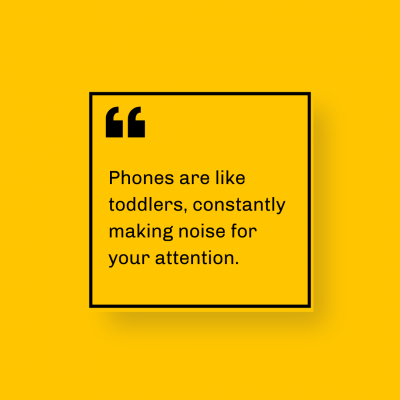October 11, 2022
Weapons of Mass Distraction: Three Simple Ways to Battle the Dumbing Effects of Smartphones

October 11, 2022

If you’re in line with the national average, it’s about three hours. Every day. Over the course of a year, that’s roughly two months spent staring and scrolling at a five inch screen.
Apart from the time lost every year, this smartphone addiction has some serious consequences. Calling it an “addiction” is fitting, as studies have shown that the dopamine release in our brains from looking at our phones is very similar to the effects of drugs and alcohol. And just like other addictions, phones can have a negative impact on our personal relationships. It might seem counterintuitive seeing as they allow us to stay in touch with people 24/7, but we’ve all experienced times when we’re talking to someone who seemed more interested in their phone than what was being said. This is beyond frustrating, but even more dangerous than hurt feelings is the fact that phones are the leading cause of car crashes every year.
With phones and other wireless mobile devices (WMDs) being such an integral part of life (and marketing!) nowadays, what can we do to leverage the power of technology without letting it control our lives? Dr. Nidhi Gupta, founder of Phreedom, has a few tips on how to achieve life-technology balance.
Phones are like toddlers, constantly making noise for your attention. The million different notifications for each app are redundant and, let’s be honest, mostly unnecessary. By just turning them off we can avoid getting sucked into the rabbit hole that lies inside.
Just because our phones can do many things doesn’t mean we need them for those things. Instead of taking notes on your phone, whip out a pen and paper. Instead of pulling out your phone every two minutes to check the time, use a wristwatch. Instead of using the alarm app, get an actual alarm clock. This is potentially the most important, as it leads into the third tip.
It is recommended that you set your phone down for at least an hour before going to bed. The stimulation we get from technology makes it harder to go to sleep and much less get a good night’s sleep. By taking an hour to read or just be with your own thoughts it is easier to decompress and go to bed sooner. Similarly, try to make checking your phone one of the last steps of your morning routine.
These sound like simple tips, but with technology now such a ubiquitous part of all of our lives – and a part of our childrens’ lives from birth – it’s important we not only teach our children healthy habits, but demonstrate those habits in our own lives. If you’re interested in learning more, be sure to listen to the riveting conversation with Dr. Gupta in the season three premiere of How It’s Done.
Stay Curious!